New Campaign Aims to Raise Emergency Funds for Seafarers
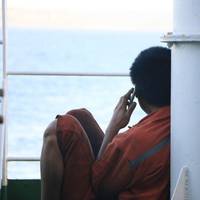
A new crowdfunding campaign aims to raise funds for developing world seafarers and their families that have been severely impacted by the coronavirus pandemic.The world's seafarers, especially those from poorer countries, are facing a number of challlenges amid the COVID-19 pandemic. Many are in lockdown with casual contracts and unable to work; others are facing difficulties due to lockdowns when they leave ships and are unable to return to their families with costs and little income coming in…
WOC Signs Pact with WISTA International
A new partnership between World Ocean Council (WOC) and WISTA International will advance women’s leadership in the sustainable blue economy.The WOC and WISTA is initiating a partnership to advance women’s leadership in the ocean and coastal business community and the Sustainable Blue Economy, said a press note.WISTA is a global organization connecting female executives and professionals from all sectors of the maritime industry. With more than 3,000 members in 49 countries, WISTA leads with the conviction that gender diversity and inclusions are the keys to providing a sustainable future for the shipping, trading, and logistics industries worldwide.Despina Panayiotou Theodosiou…
Australia Hosts GloFouling Event
The GEF-UNDP-IMO GloFouling Partnerships project has concluded its inaugural Research and Development Forum and Exhibition on Biofouling Management, in Melbourne, Australia (1 to 4 October).Bringing together experts, regulators and industry representatives to discuss the latest advances in research, regulations and technologies related to marine biofouling across all maritime sectors, this is set to become the project’s biennial “signature event”.Over 170 participants and 40 speakers took part in a program that focused on how biofouling affects different maritime industries, including shipping, aquaculture and ocean renewable energies…
Industry Bodies Join Force for Ocean Economy
The World Ocean Council (WOC) and the World Association for Waterborne Transport Infrastructure (PIANC) have signed an MOU on long-term cooperation.The partnership agreement provides a commitment and framework for the two bodies to collaborate on ocean sustainable economic development through information exchange, communications, events, joint working groups, etc. on topics of shared interest.More specifically, PIANC and WOC will begin by working together to develop tools and methods for port and coastal infrastructure adaptation that can be scaled up to address port resiliency needs, especially regarding extreme weather events affecting…
Brazil Addresses Biofouling
Biodiversity can be threatened by organisms which can build up on ships' hulls and other marine structures, a process known as biofouling.A press note from International Maritime Organization (IMO) said that during a workshop in Arraial do Cabo, Brazil (5 August), experts on biofouling and invasive species and others took the first steps towards setting up a national task force to tackle the issue.According to the UN body, Brazil is one of 12 lead partnering countries in the GEF-UNDP-IMO GloFouling Partnerships project, which aims to protect marine biodiversity by addressing biofouling.Each lead partnering country's national task force…
GloFouling Gets Going in Pacific
The initial phase of the Glofouling Partnerships project is now well and truly underway with a series of technical workshops in the Pacific, stated International Maritime Organization (IMO).The UN body said that the key message delivered to participants was that once introduced, marine invasive species can be hard to eradicate - and invasive species represent a potential major threat to the Pacific Ocean's biodiversity and the ecological integrity of Small Island Developing States.The GEF-UNDP-IMO GloFouling Partnerships project aims to protect marine biodiversity by addressing bio-invasions by organisms which can build up on ship's hulls and other marine structures.Meanwhile…
IMO Kicks-Start GloFouling Project
International Maritime Organization (IMO), the UN body, announced that a major five-year project to help protect marine biodiversity has been kick-started at a global workshop at IMO Headquarters in London, United Kingdom (18-20 March).The IMO-executed GloFouling Partnerships project will address bioinvasions by organisms which can build up on ships’ hulls and other marine structures. The project is a collaboration between the Global Environment Facility (GEF), the United Nations Development Programme (UNDP) and IMO.Representatives from 12 lead partnering countries, four regional organizations, IOC-UNESCO, the World Ocean Council and…
IMO Launches Global Project to Protect Marine Biodiversity
The GloFouling Partnerships project - a collaboration between the Global Environment Facility (GEF), the United Nations Development Programme (UNDP) and the International Maritime Organization (IMO) - has been launched.The new international effort to combat the negative environmental impacts of the transfer of aquatic species through ships will address the build-up of aquatic organisms on a ship’s underwater hull and on other marine mobile infrastructure.The introduction of invasive aquatic organisms into new marine environments not only affects biodiversity and ecosystem health, but also has measurable impacts on a number of economic sectors such as fisheries, aquaculture and ocean energy.
DP World Joins World Ocean Council
Global trade enabler DP World has become the first company in its sector to join the World Ocean Council (WOC) as part of its leadership journey to actively engage in the protection of the world’s oceans. By becoming a member of the growing international multi-industry alliance on “Corporate Ocean Responsibility” DP World will commence, enhance and advance our role as a responsible leadership company. The WOC is a global, cross-sectoral business leadership alliance with a network of over 35,000 stakeholders addressing corporate ocean responsibility. Developed by and for the private sector, it addresses issues affecting ocean sustainable development, science and stewardship.
Finding Biofouling Solutions
All ships can experience a build-up of aquatic organisms on their underwater hull and structures, which is known as biofouling. This can impact on the ship speed and energy use, and also potentially see aquatic organisms transferred to new areas, where they can become invasive species. To help address this threat, the International Maritime Organization (IMO) team preparing the new GloFouling project has taken part in the Sustainable Ocean Summit in Halifax, Canada (29 November – 1 December) where industry-led solutions to ocean sustainability challenges were being discussed. The event brought together representatives from the ocean business community…
Hull Biofouling Environmentally More Damaging than Ballasting
The entry into force of the Ballast Water Convention this September will not prevent the transfer of invasive aquatic species (IAS) unless there is mandatory legislation in place to prevent biofouling on ships’ hulls. Indeed, while there is ongoing evaluation of the Biofouling Guidelines set out in MEPC.1/Circ.811, there has been little support from IMO Member States for a new mandatory instrument to reduce the impact of bioufouling. Aside from the guidelines, the issue of biofouling is though not to be on the agenda of the MEPC or any other IMO body. There has been a number of studies comparing the transfer of IAS through ballast with that transferred by hull fouling…
Invasive Species & Ship Hull Biofouling
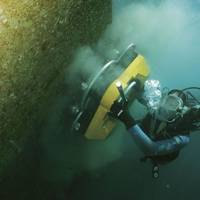
The entry into force of the Ballast Water Convention this September will not prevent the transfer of invasive aquatic species (IAS) unless there is mandatory legislation in place to prevent biofouling on ships’ hulls. Indeed, while there is ongoing evaluation of the Biofouling Guidelines set out in MEPC.1/Circ.811, there has been little support from IMO Member States for a new mandatory instrument to reduce the impact of bioufouling. Aside from the guidelines, the issue of biofouling is though not to be on the agenda of the MEPC or any other IMO body.
Sustainable Development Goals for the Oceans
The role of the marine industry in supporting the United Nations Sustainable Development Goals was addressed at the 2016 World Ocean Council Sustainable Ocean Summit in Rotterdam, Netherlands (30 November-2 December). International Maritime Organization (IMO)'s Theofanis Karayannis gave an insight into how the Organization supports ocean sustainability, including work to mitigate climate change through the reduction of greenhouse gas emissions form ships and IMO’s work to address biofouling and the transport of potentially invasive aquatic species. In line with the Summit’s theme “Ocean 2030: Sustainable Development Goals and the Ocean Business Community”…
New Plan Pledges Ferry Safety Lead
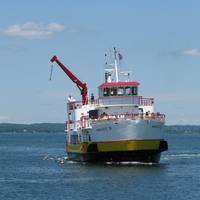
Interferry has unveiled a strategic plan promising to put safety issues at the heart of its work as the voice of the worldwide ferry industry. The pledge came at the global trade association’s 41st annual conference in Manila – a venue chosen to spotlight the challenges of domestic ferry safety in developing nations. According to Interferry, the plan signals its overriding ambition to help lift ferry safety in all parts of the world to the very high standard already in place in North America and Europe, where casualties in recent decades have been extremely rare.
Changing Spill Risk in a Changing Arctic Landscape

Industry analyst and environmental consultant Dagmar Schmidt Etkin, PhD, takes a hard look at a rapidly shifting operational landscape in the Arctic. Always an honest broker of information, Etkin tells it like it is. Oil spill risk is present anywhere that oil is present in reservoirs, or is transported, consumed, stored, and handled in some way. The Arctic is no exception. Not only are there oil reserves in the Arctic, some of which are being or will soon be considered for exploration and production, there is also oil being transported as cargo or as fuel to Arctic communities.
Dubai Partners with WOC on Ocean Sustainable Dwevelopment
The Dubai Council on Marine and Maritime Industries (DCMMI) and the World Ocean Council (WOC) have agreed to collaborate on ocean sustainable development and corporate ocean responsibility. The WOC is increasingly working with and through “maritime clusters” to advance these goals. “The World Ocean Council is a unique global business leadership organization committed to advancing ocean sustainable development, stewardship and science,” DCMMI Chairman, Khamis Juma Buamim, stated. “We look forward to working with DCMMI to better engage leadership companies from Dubai and the UAE,” WOC CEO, Paul Holthus, added.
ICS is Shipowners' Rep at UN Meets
At the United Nations in New York, the International Chamber of Shipping (ICS) is representing the interests of shipowners at the opening session of a UN Preparatory Committee starting work on a new legal instrument under the United Nations Convention on the Law of the Sea (UNCLOS). The establishment of the new UN Preparatory Committee, under the auspices of the Division for Ocean Affairs and the Law of the Sea, follows the decision of the United Nations General Assembly, in 2015, that UNCLOS should be expanded to include a new legally binding instrument on the conservation of marine life in areas beyond national jurisdiction. This is particularly relevant to shipping because the new UN instrument could include area-based management tools such as Marine Protected Areas on the high seas.
CLIA Joins World Ocean Council
Cruise Lines International Association (CLIA) has partnered with the World Ocean Council (WOC), an international business leadership alliance dedicated to Corporate Ocean Responsibility. For years, cruise lines have implemented policies and procedures to reduce the industry’s environmental impact. While CLIA members’ approximately 300 oceangoing cruise ships, expected to transport 24 million travelers this year, comprise far less than 1 percent of the global merchant fleet’s 50,000 oceangoing ships, they are at the forefront of developing responsible environmental practices and innovative technologies that lead the world’s shipping sector. Many cruise lines not only meet, but exceed environmental regulatory requirements in a number of areas.
'Blue' Economy Ocean Industries & the Next 50 Years
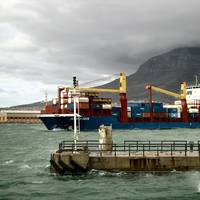
“Sustainable development” has gone from buzz word to business imperative in the two decades since the initial Earth Summit in Rio de Janeiro in 1992. Companies are increasingly evaluated on how well they address sustainability as a critical measure of their commitment to the triple bottom line – people, planet and profit. Stakeholders expect companies to develop sustainability and corporate responsibility programs and reporting as part of efforts to take up civil society concerns and maintain the social license to operate.
Bechtel Joins World Ocean Council
The global engineering, project management and construction company, Bechtel has become a member of the World Ocean Council (WOC), the international business alliance for Corporate Ocean Responsibility. Bechtel brings considerable experience and expertise in the design, engineering and construction of sustainable ports and coastal infrastructure. The company has worked on more than 80 ports and coastal projects around the world. Its projects include Khalifa Port (UAE), Jamnagar Refinery and Port Complex (India) and Jubail Industrial City and Port (Saudi Arabia). “Smart planning, innovation and having an integrated approach are key to developing sustainable infrastructure,” said Tam Nguyen, global head of sustainability at Bechtel.
The Sustainable Ocean Summit set for Singapore
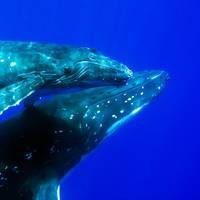
“Sustainable development” has gone from buzz word to business imperative in the two decades since the initial Earth Summit in Rio de Janeiro in 1992. Companies are increasingly evaluated on how well they address sustainability as a critical measure of their commitment to the triple bottom line – people, planet and profit. Stakeholders expect companies to develop sustainability and corporate responsibility programs and reporting as part of efforts to take up civil society concerns and maintain the social license to operate.
MPA Chief to Keynote SOS 2015
Mr Tan will provide the opening keynote address for the World Ocean Council’s Sustainable Ocean Summit, (SOS), 9-11 November 2015. MPA Chief Executive Mr Andrew Tan stated, “Singapore is honoured to host the first Sustainable Ocean Summit to be held in Asia. In reflecting on the unique nature of the WOC, he added, “Ensuring that responsible maritime businesses are contributing to maintaining a healthy global ocean requires a global, multi-sectoral effort. The WOC distinguishes the SOS as a “working conference”, i.e. the event discussions are documented and then help shape WOC workplans, priorities and actions - as part of the ongoing efforts of WOC to support its Members and the broader ocean business community to advance “Corporate Ocean Responsibility”.
MPA Calls for Integrated Approach to Blue Economy
In his opening address at the Sustainable Ocean Summit 2015 held in Singapore today, Chief Executive of the Maritime and Port Authority of Singapore (MPA) Mr Andrew Tan called for an integrated approach bringing together the science, the research, technology and different disciplines to understand the various eco-systems within the oceans and uncover more of the nexus between land and sea and how each affects the other. Tan's speech also underlined four principles to ensure an enduring Blue Economy that fulfils the twin goals of growth and sustainability, i.e. good governance, long-term vision, good execution, and strong partnerships.









